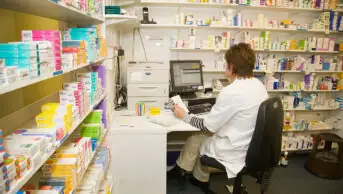
Shutterstock.com
Some 16% of pharmacists undertook designated prescribing practitioner (DPP) training within the past year, a survey carried out by the Pharmaceutical Journal has found.
Responding to The Pharmaceutical Journal’s 2024 salary and job satisfaction survey, when asked if they had undertaken DPP training in the past year, just 83 out of 513 UK pharmacists across all sectors (16%) said yes, 390 (76%) said no and 40 (8%) said they planned to within the next year.
The survey, conducted between 15 April 2024 and 30 April 2024, showed that community pharmacists were the most engaged in DPP training, with 11 out of 46 (24%) respondents working in the sector saying they had undertaking training.
Hospital pharmacists, meanwhile, had the least amount of engagement in DPP training, with 19 out of 216 (9%) hospital pharmacists responding ‘yes’ to the question.
Those saying they had undertaken DPP training in the past year also included 29 out of 151 (19%) pharmacists working in GP practices or primary care networks, and 4 out of 33 (12%) pharmacists from integrated care boards (ICBs) and health boards.
In September 2023, NHS England awarded ProPharmace a £500,000 contract to train 500 community pharmacists to become DPPs by the end of March 2024.
A further 500 places for training DPPs and education supervisors was announced in May 2024 for 2024/2025.
From 2026, all trainees will become independent prescribers from the point of registration.
This means that all trainees from the 2025/2026 foundation year will need a DPP to supervise them during their prescribing training.
However, pharmacists have warned that there is a shortage of DPPs.
In a statement published in May 2024, the National Pharmacy Association (NPA) warned that unless training sites already had a DPP in place, the likelihood of having one for the start of the 2025/2026 foundation year was “slim“.
It encouraged members to consider withdrawing from the Oriel scheme if they felt that they would not be able to source a DPP, to avoid unintended consequences for prospective students.
However, overall, Graham Stretch, president of the Primary Care Pharmacy Association (PCPA) said the 16% of survey respondents who said they would take the training “probably would be sufficient”.
“I think we need somewhere in the region of 1,000–1,500 DPPs ideally working for 2025/2026, but it could be fewer because we can have multiple [trainees],” he said.
“The difficulty with surveys such as this is that you tend to select out the people who are already well engaged… If it were to be reflective of the register, it would be sufficient. But of course we have no way of knowing that.”
When asked if they had acted as a DPP in the past year, some 70 pharmacists (14%) answered yes, while 409 (80%) said no and 34 respondents (7%) said they planned to do so within the next year.
Of those who said they had not acted as a DPP in the past year, 231 (45%) attributed it to a lack of opportunity in their current role, 199 (39%) blamed lack of time and 137 (27%) said it was owed to lack of remuneration.
Meanwhile, 133 (26%) said they had not acted as a DPP because they lacked experience, while 73 (14%) answered ‘lack of interest’.
“That rings well with my conversations, experience and surveys that I’ve seen,” said Stretch. “Those numbers feel about right and illustrate that we do have a job between now and July. That said, we’re making progress.”
Stretch added that he was “cautiously optimistic” at this stage that the sector will have sufficient capacity of DPPs — although not necessarily everywhere they are needed.
Responding to the survey results, Claire Anderson, president of the Royal Pharmaceutical Society, said: “These survey results reflect the challenges highlighted in our joint report with the NPA regarding access to designated prescribing practitioners in community pharmacy across England.
“To address the DPP shortage, prescribers must be appropriately supported with dedicated time for training and supervision, alongside protected learning time for their own development.
“Clear job planning and collaboration between employers and NHS education organisations are essential to remove barriers to prescribing training.”


